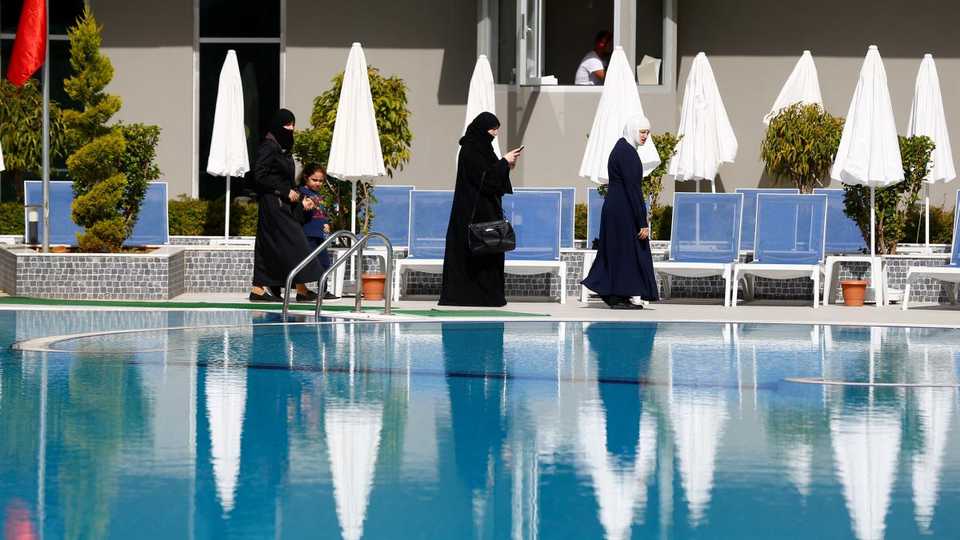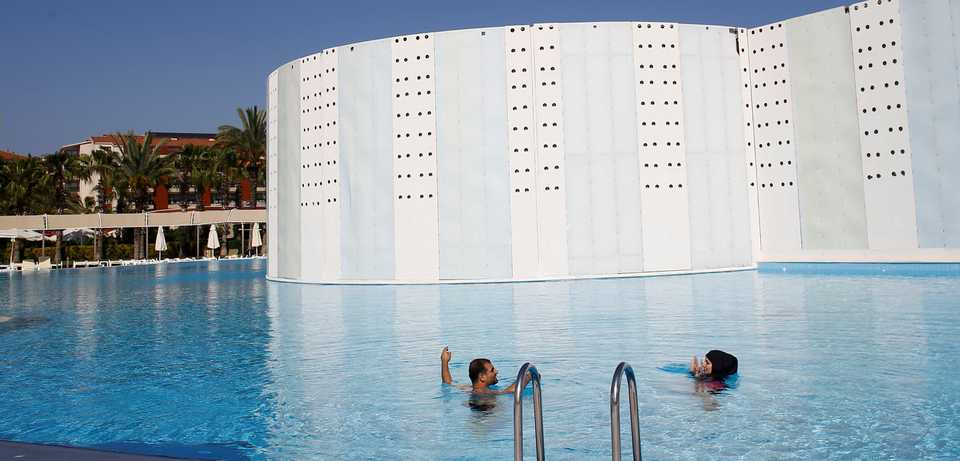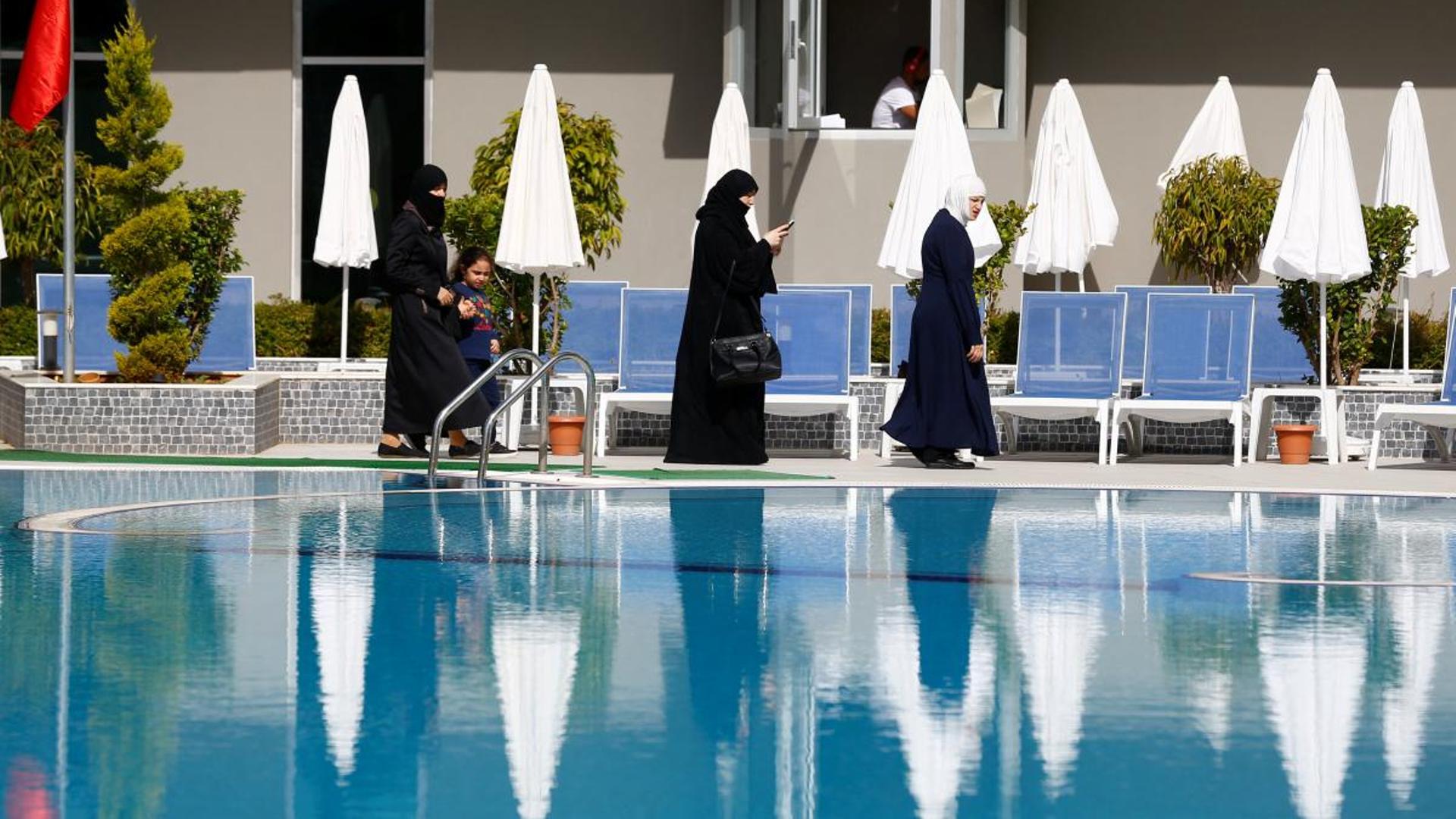
After reaching a 10-year low in 2016, in the aftermath of a wave of Daesh and PKK attacks as well as a deadly failed coup, Turkey’s tourism sector has been on the rebound during the past two years.
Around 40 million tourists are expected to visit Turkey till the end of 2018.
Dozens of hotels on Turkey’s coasts, are now also featuring segregated pools and beaches for men and women in accordance with Islamic guidelines on modesty, and are attracting families from Turkey, the Middle East and Muslim communities in the West.
The global industry for halal tourism stood at approximately $226 billion last year, according to the Halal Summit Council.
After Malaysia, Dubai and Indonesia, Turkey is the fourth most popular destination for tourists who seek halal offers.
And it is aiming to increase its share from 2 percent to 10 percent in the coming few years to become one of the top visited locations.
Ufuk Secgin, marketing director of halalbooking.com, an online platform that specialises in halal friendly hotels, spoke to TRT World ’s Money Talks about halal tourism, “In 2018, we have maintained double growth trend. Last year we saw 35,000 tourists booked halal friendly resorts in Turkey. And this year, we are aiming to increase this number to 75,000-90,000.”
“We have seen also bed capacity is increasing more and more. Hotel owners are encouraging to invest into this growing market in Turkey but also outside of Turkey such as Indonesia, Malaysia etc.” he added.
According to Secgin, customers from Gulf Cooperation Council (GCC) countries such as Qatar, Kuwait, Saudi Arabia or Northern African countries like Algeria and Tunisia are interested in visiting Turkey because it’s a majority Muslim country. He emphasised religious heritage and history are an important factor for Muslim tourists choosing a destination.
Secgin mentioned that some hotels have converted themselves to enter the halal market.
Some Hotels have practical solutions to fit the criteria of a Muslim-friendly halal hotel: they have women use the pool in the morning hours and men use it in the evenings, according to Secgin.
Mumin Abla, a 40-year-old man who is visiting Turkey from the UK with his family, says the reason he chose Turkey is for its natural beauty and history. He told TRT World that another main reason is that people can enjoy easy access to halal foods in any part of the country.
Another tourist Mohamed Omar, an Egyptian who lives in Ireland, told TRT World that he prefers halal tourism options.
He added that, “When you go to any Western country, you face some issues ranging from the bathrooms to the kind of food on offer. You know there are so many restaurants in Western countries that prepare food with pork and other haram stuff.”
Omar further said that apart from the kind people and mix of cultures and food flavours, another attraction he finds in Turkey is the easy access to mosques everywhere in the country.
He said that if his wife were to wear burka they would be made to feel uncomfortable in Western countries.
“Women who wear clothing from Muslim cultures are usually subject to racism or stereotyping. So Muslim women feel more comfortable in segregated places like the swimming pools most of the hotels offer in Turkey,” Omar said.

What is halal tourism?
“Halal” means permissible for Muslims in Arabic. The halal concept applies to foods and all daily activities in accordance with Islamic law and tradition.
Segregated swimming pools or beaches for women, private family pools and alcohol-free menus are determining factors for tourists looking for halal tourism.
Halal-friendly institutions also offer a copy of the Quran, prayer mats as well as a sticker on the hotel room’s ceiling to show the qibla or the direction of the Kaaba – the sacred building in Mecca – which Muslims face during prayer.
Government efforts
Efforts by the Turkish government to promote the halal tourism sector in the country have geared up during the past two years.
Istanbul will also be hosting a Halal Expo and World Halal Summit 2018 from November 29-December 2 under the auspices of the Presidency of the Republic of Turkey to increase cooperation among countries of the Organization of Islamic Cooperation.
Dr Huseyin Pamukcu from Kastamonu University and secretariat of the International Halal Tourism Organization talked to TRT World about the efforts being made for halal tourism.
He said, “The Turkish Culture and Tourism Ministry added Halal Tourism in the 2023 Vision at the third Tourism Summit that was held last year. In the conference, the decision was taken to give government assistance to domestic investors to manage resorts with a halal tourism certificate. There is also an incentive for converting existing tourism establishments to halal tourism friendly hotels.”
Pamukcu says that to realise the full potential of halal tourism in Turkey, tour operators, guides and agencies should be supported. He added that relevant booklets and advertising should be produced immediately to attract more tourists.










Discussion about this post